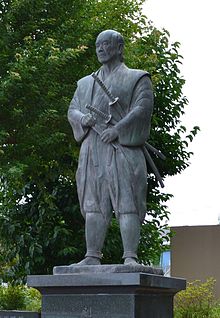Tsukahara Bokuden (塚原 卜伝, 1489-6 March 1571) was a famous samurai of the early Sengoku period who is considered a kensei (sword saint). He is the founder of the Kashima Shintō-ryū style and was the instructor of the shogun Ashikaga Yoshiteru and the daimyō of Ise province, Kitabatake Tomonori.
Tsukahara Bokuden Biography

Bokuden was born into the Yoshikawa family in the Hitachi province of Honshū. His family is one of the four karō families serving the Kashima clan, one of the younger branches of the Imperial House of Japan (descended from Emperor Kanmu).
He was adopted by the Tsukahara family, affiliated with the Kashima clan, and was named Tsukahara Bokuden Takamoto. At the beginning of his life, his name is Tsukahara Shin'emon Takamoto.
Bokuden studied the Tenshin Shōden Katori Shintō-ryū style with his adoptive father and then honed his skills by beginning his musha shugyō (samurai ascetic wandering), traveling throughout Japan and training with most of the best recognized swordsmen of his time.
Tsukahara Bokuden is the archetypal "knight errant" because he was born a nobleman and wealthy but traveled throughout Japan, often with companions. He later systematized the teaching of local martial arts in the Kashima region, including the approaches to combat Kashima no tachi and Ichi no tachi.
After supposedly receiving divine inspiration from Takemikazuchi no kami, the deity of the Kashima-jingū, he called his martial art Kashima Shintō-ryū except for a brief period when he called it Mutekatsu-ryū ("winning without hands").
In an anecdote told in the Kōyō gunkan, Bokuden crosses Lake Biwa on a raft with other travelers, one of whom is a pretentious swordsman. When asked about his style, Bokuden replies that he has studied the "swordless style" and that it consists "not in defeating others, but in not being defeated."
The swordsman then asks him why he carries weapons and Bokuden replies that "it requires him to remain in control so as not to respond to provocation.
Which is quite a challenge. Enraged, the samurai yells at the boatman to row to the nearest shore to confront Bokuden on land, but the boatman suggests that it would be better to go to an island in the lake, far from any habitation, so as not to provoke a crowd and to be more quiet.
The samurai agrees, but as he jumps from the boat to the island, impatient to fight and already drawing his blade, Bokuden pushes the boat with the boatman's pole, leaving the samurai alone on the island. Bokuden then shouts to him, "See, that's what winning without a weapon is all about!"
A famous Japanese folk tale tells that the young Miyamoto Musashi challenged Bokuden to a duel during a meal. When Musashi strikes first, Bokuden matches his sword with the lid of the iron pot he was eating from. In reality, the story has no historical basis, as Bokuden died thirteen years before Musashi was born.
According to the historian Tokitsu Kenji, the saint Tsukahara had his first duel at the age of 17 and won it. He participated in a total of 37 duels, all of which he won, and 19 of which ended in the death of the opponent. He was wounded 6 times in total, but only by arrows. He is said to have killed a total of 212 people.
Bokuden died of natural causes in 1571. His tomb is in the Baiko temple of Suga in Kashima in the present Ibaraki prefecture.
Tsukahara Bokuden Posterity
After his death, those dedicated to the art of swordsmanship make a pilgrimage to Kashima-jingū which is considered the spiritual home of kenjutsu.
One of the precepts of karate is "Mind over technique" and illustrates this with an anecdote about Bokuden: "One day, a famous sword master, Tsukahara Bokuden, wanted to put his sons to the test. To begin with, he called Hikoshiro, the oldest of the three.
When he opened the door with his elbow, he found it heavier than usual, and when he passed his hand over the top of the door, he noticed that a heavy wooden headrest had been balanced. He took it off, entered and put it back exactly as he had found it.
Bokuden then sent for his youngest son, Hikogoro. When Hikogoro pushed the door open, the headrest fell off, but he caught it in flight and put it back in its place. Bokuden finally called Hikoroku, his youngest son, the best by far at swordplay.
The young man pushed the door powerfully and the headrest fell, hitting his bun. In a flash, he drew the short sword he wore on his belt and sliced the object before it hit the tatami. To his three sons, Bokuden said, "You, Hikoshiro, will pass on our method of swordplay.
You, Hikogoro, by training hard, perhaps one day you will equal your brother. As for you, Hikoroku, you will certainly lead our school to its ruin one day and bring opprobrium to your name. I cannot afford the luxury of keeping such a reckless individual in my ranks. With these green words, he disowned him. This perfectly illustrates the increased importance of mental faculties over technical faculties."


